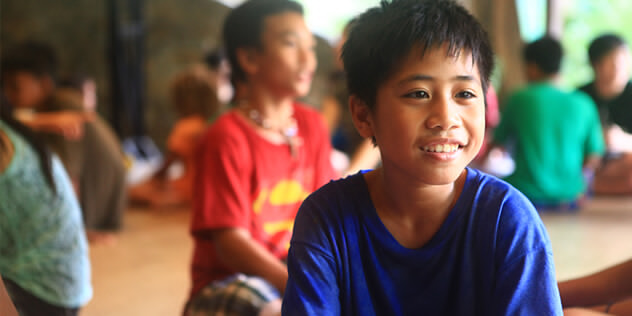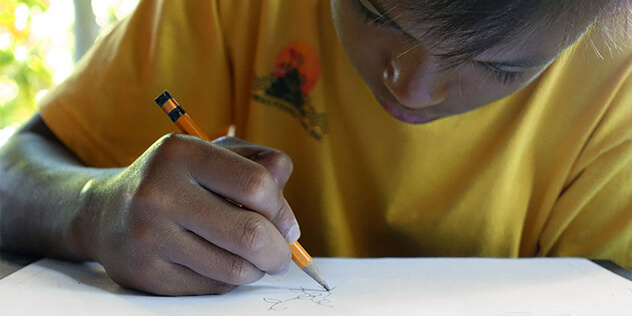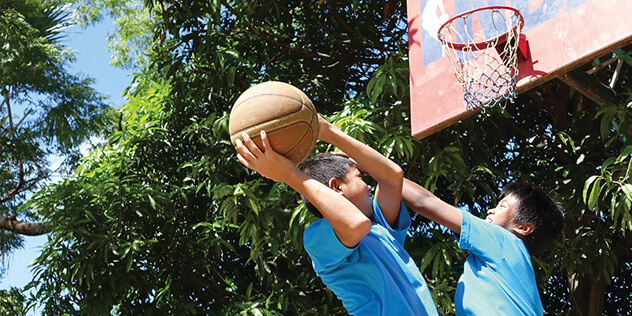
Millions of street children in the world constitute a silent but constantly growing minority. Some of them are orphans, but most are forced away from their families because of violence and abuse in their home. Living on the streets, drugs, gangs and crime almost inevitably become a normal part of their daily life.
Stairway serves as a home for children who used to live on the streets. They come with an abundance of health problems, familial problems, drug problems, are in conflict with the law, and have been victims of physical and/or sexual abuse. We also accommodate street children with TB to give them the needed medical care and an environment conducive for healing.
Each year in June, we invite up to 14 boys to become a part of a one year program. The age of the boys ranges from 10-14 years old. While at Stairway’s Family Home, the children are engaged in non-formal education, psychosocial interventions, creative therapy, livelihood skills training, sports and recreation, and ‘Youth for Change’ camps involving children from around the world.
We have our own school approved by the Philippine Department of Education. Upon admission, the boys are assessed for intellectual capacities and learning ability. They are placed in groups for basic learning skills or more advanced learning skills, depending on the results of the assessment. Classes are small, allowing for individual attention and flexible pace of learning. Class subjects include reading, writing, arithmetic, English, Tagalog, science, geography, history, and computer skills. A vast majority of the children embrace the unique opportunity for learning, and they progress immensely in a short span of time. Many of the boys enter the program with zero or minimal education, but they leave with basic skills in reading, writing, and math.

Psychosocial intervention includes psychological assessments before arrival and again before graduating from the program. The information gathered from the initial assessment provides invaluable information that will be used to create treatment plans for each child. Psychosocial issues are dealt with in individual and group therapy sessions. Monthly progress reports and case conferences are completed to help evaluate the progress of each child. As the children progress psychologically and emotionally, we watch them grow into more mature children, who are better equipped to handle the after effects of years of trauma.
Creative therapy takes form through dance, music, art, and theatre. We utilize creative expressions to stimulate learning, to provide a constructive means for self-expression, and to serve as a medium for the release of pent-up tensions and emotions. Each year, we are amazed at the hidden talents of the children that enter into our program. The boys come in with little exposure to the arts. When they are ready to leave, they have performed 2-3 theater pieces in front of large audiences, completed several paintings on canvas, performed concerts with percussion instruments and guitars, and presented choreographed dance numbers for celebrations.
Another form of creative expression takes place through our livelihood skills training program. The children learn how to create a variety of handicrafts such as woven bracelets, stone jewelry, dream catchers and tie-dye shirts. With the making of crafts, they are able to earn money that they take with them when they graduate from the program. Stairway buys the products from the children and sells them in our store. As the children learn to master these new skills, they are tasked with teaching other children, when we host our ‘Youth for Change’ camps. An empowering experience that helps to boost low self-esteem.

Sports and recreation are a big part of the programming at Stairway. When the new boys enter into our program they are usually malnourished and with a variety of health issues. Along with receiving basic medical and dental care, they learn a variety of sports and activities that help to strengthen their bodies and minds. Common sports activities for the children are: basketball, swimming, gymnastics, volleyball, badminton, and football. The children are also actively engaged in a sailing program through a partnership with our local Yacht Club. Once the skills of basic sailing are learned, the children participate in regattas, often placing with top awards.
As Stairway is a Learning and Resource center for Children’s Rights, we integrate a variety of ‘Youth for Change’ camps into our residential program. Children from a number of international schools covering 3 different continents participate in camps together with the Stairway children and children from various indigenous communities. Each camp has an educational theme such as Environmental Awareness or the Millennium Development Goals, with the common thread of children’s rights woven into each chosen theme. The interaction between children from all walks of life is an amazing process to watch unfold. Stereotypes and prejudices are seamlessly altered to mutual feelings of respect and understanding. Participants often remark that attending a ‘Youth for Change’ camp was a life-changing experience.
With constant contact with children fresh off the streets, we use our Family Home Program as a source of information and education to increase our knowledge and understanding of the complexity of problems facing street children. This knowledge and understanding becomes the base for the development and the design of our larger advocacy for child protection.